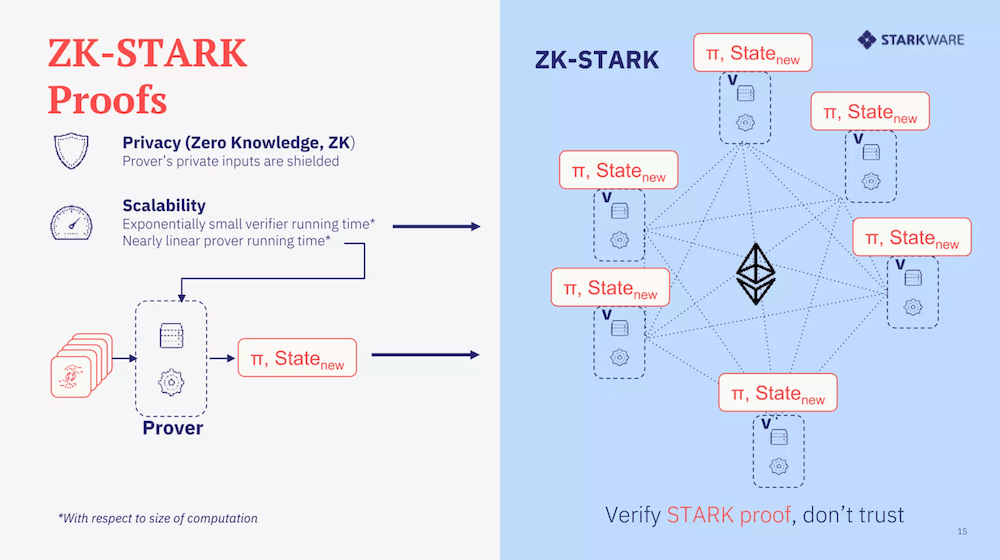The Role of Zero-Knowledge Proofs (ZKPs) in Starknet’s Security Model

Blockchain technology is evolving fast, bringing scalability, privacy, and security challenges. As decentralized platforms grow, ensuring both security and efficiency is crucial. In the Starknet ecosystem, zero-knowledge proofs (ZKPs) help address these challenges. Starknet, a Layer 2 scaling solution for Ethereum, uses ZKPs to create a fast, efficient, and secure environment for decentralized applications (dApps). In this article, we’ll explain how zero-knowledge proofs enhance Starknet’s scalability and security model—and how Braavos, a smart contract wallet on Starknet, uses this technology to protect users.
What is a ZK Proof for Dummies?
At its core, a zero-knowledge proof is a cryptographic protocol that lets one party (the prover) demonstrate something to another party (the verifier) without revealing the actual data. This ensures privacy while maintaining trust.
Imagine needing to prove you’re over 18 without showing your exact age. With a ZKP, you could confirm you’re old enough without sharing personal information. This is how ZKPs work—proving something without revealing the underlying data.
In the context of Starknet, ZKPs are used for scalability, not privacy. This means Starknet verifies computations without revealing sensitive data to the Ethereum network, making transaction validation fast and efficient.
What is the Main Purpose of Zero-Knowledge Proof?
The main goal of zero-knowledge proofs is to ensure security and efficiency while keeping sensitive data private. Traditional cryptographic methods often require sharing details, which can expose data and slow down processes. ZKPs avoid this by verifying information without revealing the details.
In Starknet, ZKPs help the network scale by verifying off-chain transactions and computations. Instead of having Ethereum re-execute every transaction, Starknet bundles multiple transactions and submits proofs that are easy for Ethereum to verify. This keeps the network fast, scalable, and secure. Starknet uses a specific type of ZKP called STARKs, which are designed for scalability and transparency.
What is the Difference Between Proof of Knowledge and Zero-Knowledge Proof?
While both proof of knowledge and zero-knowledge proofs are important cryptographic tools, they serve different purposes.
A proof of knowledge shows that someone knows something, like a password or a private key. But with a zero-knowledge proof, you can prove you know something without revealing what it is.
For example, if you want to prove you control a wallet’s private key, a proof of knowledge would require you to reveal the key. With a zero-knowledge proof, you can prove control of the key without disclosing it. This distinction is crucial in blockchain applications, where privacy is important.
How Do ZKPs Strengthen Starknet’s Scalability?
In Starknet, zero-knowledge proofs are primarily used for scalability. Starknet uses STARKs to process transactions off-chain, reducing the load on Ethereum’s Layer 1. This enables Starknet to process thousands of transactions efficiently without congesting Ethereum’s network.
Here’s how it works: Starknet bundles multiple transactions into one proof, which Ethereum can verify without re-executing each transaction. This approach makes Starknet highly scalable, with faster transaction speeds and lower gas fees.

While Starknet focuses on scalability, ZKPs also have privacy applications in other contexts. For instance, ZKPs can be used to prove eligibility, such as proving you’re over 18, without revealing sensitive details like your birth date. Projects like Zcash use ZKPs for private transactions, where amounts and parties remain hidden.
What are the Disadvantages of Zero-Knowledge Proof?
Despite their advantages, zero-knowledge proofs have some drawbacks. One challenge is the complexity of generating and verifying ZKPs, which can require significant computational resources. This can lead to higher costs in some systems.
However, Starknet addresses this challenge with STARKs, which are optimized for scalability. Unlike other ZKPs that rely on complex trusted setups, STARKs are more transparent and efficient. While some trade-offs remain, Starknet’s use of ZKPs ensures that the benefits far outweigh the drawbacks.
For Braavos users, this means they enjoy secure transactions and interactions without the performance issues that other systems might face.
Are Zero-Knowledge Proofs Quantum-Resistant?
One of the biggest concerns in cryptography is the potential impact of quantum computing. Many existing cryptographic systems could be broken by quantum computers, which would pose a significant security risk. Fortunately, STARK-based zero-knowledge proofs are considered quantum-resistant because they don’t rely on cryptographic assumptions vulnerable to quantum attacks.
This quantum resistance ensures that Starknet and Braavos will remain secure even as quantum computing develops. As blockchain technology continues to evolve, having quantum-resistant security is essential for the future of decentralized platforms.

Braavos: Enhancing User Security Through ZKPs
As a smart contract wallet built on Starknet, Braavos leads the way in blockchain security. By leveraging zero-knowledge proofs, Braavos ensures that user assets remain protected by cutting-edge cryptographic methods.
Braavos offers several advanced features like 2FA Hardware Signer and 3FA Multi-Signer, adding extra layers of security. These features make Braavos one of the most secure wallets on Starknet, ideal for users looking to protect their assets in a scalable and secure ecosystem.
Additionally, Braavos’ DeFi Dashboard and one-click invest features provide users with seamless experiences while maintaining security.
Conclusion
Zero-knowledge proofs are crucial to Starknet’s scalability and security model. By utilizing STARKs, Starknet ensures that computations can be processed efficiently off-chain, making the network faster and more scalable. For Braavos users, this means enhanced security and a smooth experience interacting with decentralized applications.
As blockchain technology continues to grow, zero-knowledge proofs will remain a key factor in improving security and scalability, ensuring that platforms like Starknet and wallets like Braavos can meet the demands of the future.


